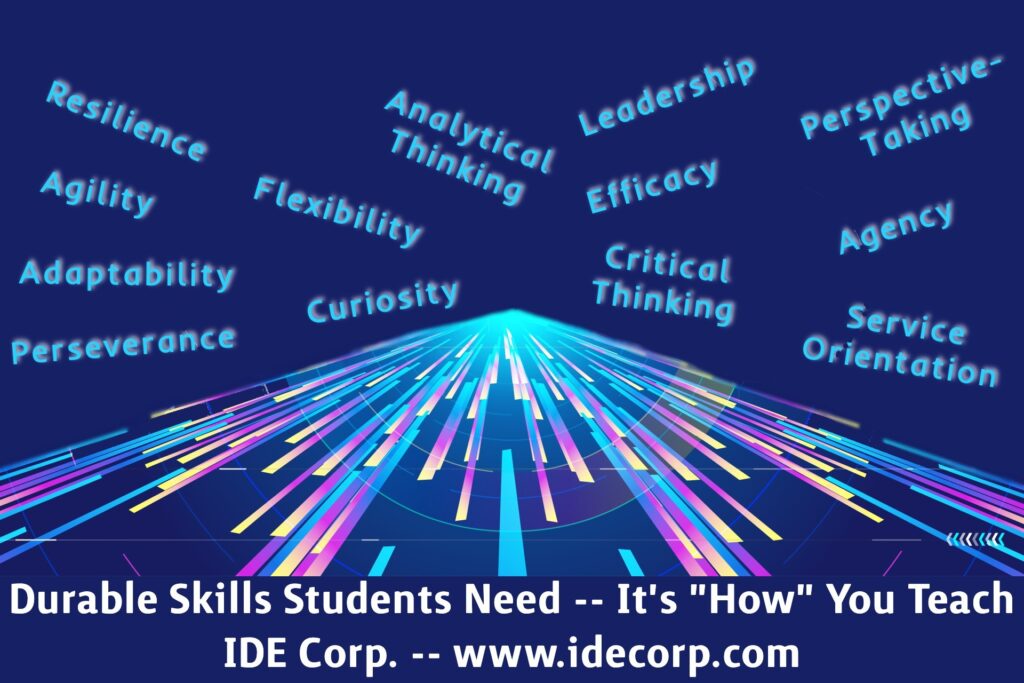Curriculum tells us what to teach. But what if the most profound and lasting impact we have on our students lies not just in what we teach, but in how we teach it?
Preparing Students for Today and Their Future
Our students will navigate careers that may not even exist yet, solve problems we can’t currently imagine, and interact with a global community of varying perspectives. The World Economic Forum’s “Future of Jobs Report 2025” details the type of skills students need for their futures, and they’re not the skills typically taught in schools.
The key to building future-powered skills is not in what teachers teach, but in how teachers teach. When students engage in classrooms that put them in charge of their own learning; engage in solving meaningful, challenging, real-world problems; and work as collaborative members of a learning community, they develop more than just academic knowledge. They build durable skills that will serve them across all contexts of their lives. Think about it: Most, if not all, of the content you need to learn is available through the internet. What truly empowers an individual is the ability to overcome challenges, embrace new opportunities, and contribute meaningfully to the world: the durable skills.

Durable Skills Taught Through “How” You Teach
- – Resilience: The ability to bounce back from setbacks and learn from failure
- – Flexibility & Agility: The capacity to adapt to changing circumstances and think quickly on one’s feet
- – Adaptability: The willingness and ability to modify approaches and strategies in response to new information or situations
- – Perseverance: The determination to see tasks through to completion, even when faced with obstacles
- – Curiosity: The intrinsic drive to explore, question, and seek deeper understanding
- – Analytical Thinking: The ability to examine something by separating it into its component parts to understand how it works
- – Critical Thinking: The ability to evaluate information or arguments in order to form a reasoned conclusion
- – Agency: The capacity to make choices and take ownership over one’s learning, behavior, or goals
- – Efficacy: The belief in one’s own ability to achieve a desired outcome through effort
- – Perspective-Taking: The capacity to understand and consider viewpoints different from one’s own
- – Leadership: The ability to guide, inspire, and influence others effectively
- – Service Orientation: A mindset focused on contributing to the well-being of others and the community
These are not skills that can be neatly packaged into a unit plan and “taught” in isolation. Instead, they are cultivated through the very fabric of the learning experience teachers create.
Rethink the Learning Experience to Build Durable Skills
Consider a classroom where students:
- – Grapple with challenging real-world problems without immediate answers: This builds resilience, perseverance, and critical thinking.
- – Work collaboratively on open-ended projects: This fosters flexibility, agility, perspective-taking, and even leadership.
- – Are given opportunities to explore topics of their own interest: This ignites curiosity and cultivates agency.
- – Are provided with constructive feedback and opportunities for revision: This strengthens efficacy and the understanding that learning is a process.
- – Are challenged to consider the impact of their actions and ideas on others: This can foster service orientation.
Schools don’t need to abandon academic content to build these skills. The key is designing learning experiences that prioritize how students engage:
- – Are they solving real-world problems?
- – Are they reflecting on their growth?
- – Are they making choices in their learning paths?
- – Are they working in collaborative teams?
- – Are they iterating, revising, and trying again?
A Call to Action: Raise Test Scores for Today WITH Durable Skills for a Lifetime
If we design instruction for increased test scores and more — if we design for whom students become — we can graduate learners who are not just knowledgeable, but also possess the enduring skills that will serve them throughout their lives and career paths.
My books Students Taking Charge (K–5 & 6–12) and Reinventing the Classroom Experience detail a classroom framework that builds enduring skills alongside academic skills. Our instructional planning resource, MyQPortal, offers a reflection grid so you can see how the various structures and strategies of the classroom can support building durable skills. Take a look (if you’re not a MyQPortal subscriber, just click through, as it is free content) and reflect on your own classroom or the classrooms in your school or district. See what you can add to your classroom framework to promote durable skills that will serve your students for their lifetimes!
IDE Corp. offers on-site and remote consulting services and professional learning opportunities in this area. We also offer online professional learning experiences to support this goal:
- – Virtual Learning Communities (VLCs) — 2- to 5-week online courses with flexible engagement, facilitated by a consultant
- – Professional Learning Experiences (PLEs) — Subscriptions sold to a school to engage all faculty in a culture of professional learning around key topics in education
To schedule a free consultation to determine how we can help you infuse durable skills into your instructional program, contact us at solutions@idecorp.com.
